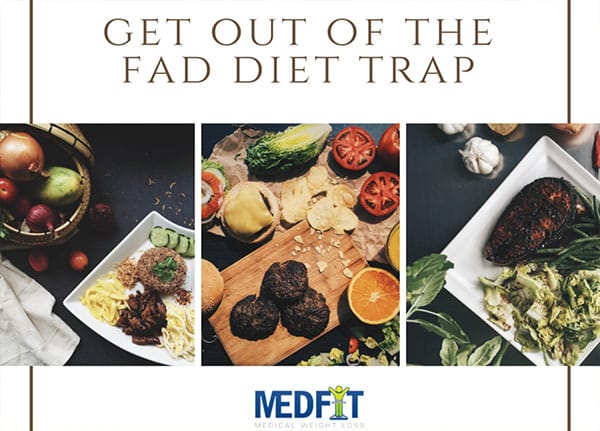 A diet by definition entails restriction of calories, or even a whole food group. When doing this, you should be able to lose weight just by the sheer fact that you are making a restriction of some sort, which should mean that you are also at a calorie deficit. If you’re looking for quick weight loss, starting a fad diet probably sounds appealing. This is because fad diets give the promise of a quick fix, however it’s generally in an unhealthy fashion that isn’t sustainable for the future. This is, in part, due to the restrictive and monotonous nature of fad diets.
A diet by definition entails restriction of calories, or even a whole food group. When doing this, you should be able to lose weight just by the sheer fact that you are making a restriction of some sort, which should mean that you are also at a calorie deficit. If you’re looking for quick weight loss, starting a fad diet probably sounds appealing. This is because fad diets give the promise of a quick fix, however it’s generally in an unhealthy fashion that isn’t sustainable for the future. This is, in part, due to the restrictive and monotonous nature of fad diets.
Unfortunately, the largest proponents of fad diets such as the paleo diet or intermittent fasting are widely influenced in social media where we see it constantly. Fad diets tend to eliminate certain food groups, however each specific food group has its own nutritional profile offering a varying degree of vitamins and minerals. Foods such as fruits, vegetables, whole grains, and dairy reduce the risk of chronic diseases and when you eliminate them from your diet, you lose all of the potential benefits. While there are certain pro’s to some fad diets, for instance the paleo diet emphasizes whole foods such as fruits and vegetables versus processed foods with high sugar and sodium, they don’t set you up to maintain the weight.
Just as the weight didn’t increase overnight, it will not decrease overnight either. Often times, they are crash-diet worthy without any type of physical activity involved. If you are following a fad diet to a “T”, and see the scale rapidly decreasing, this weight is most likely water weight. You will see a loss of total body water before you see a loss in fat mass, which means that once you begin to eat normal foods after the diet, the weight will come back even quicker than you had expected.
Here are a few fad diets…
The Juice Diet: The idea is to consume only juice from fruits and vegetables to reap the rewards of important vitamins, minerals, and phytochemicals. The issue here is that it is purely a liquid diet that requires not only a ‘detoxification’ process as well as a slow re-introduction back into regular food. Once you do re-introduce regular food, chances are you will regain the weight back very quickly, as well as continue your old eating habits.
The Grapefruit Diet: The claim with this diet is that the grapefruit is the one and only magical food source capable of weight loss. This is very restrictive because it only allows you to eat one type of food, while missing out on protein, healthy fats, and other vitamins and minerals.
The Paleo Diet: The paleo diet focuses on consuming only foods that our ancestors consumed, so mainly sources that you could hunt and gather in a day such as fish, wild game, berries, nuts, seeds, meats, vegetables, and some fruit. So, no dairy, grains, cereals, pastas… etc. This idea is actually a pretty good start because it really does focus on eating the “right” foods, however the nutrition profile of ancient food sources isn’t the same as they are in modern times (different environment, farming, etc.) so this concept doesn’t really make sense. People also often tend to distort the allowance of meat and extend it into things like bacon that is loaded with saturated fat. In its most basic form, the paleo diet should help people eat better, but because there aren’t rules that designate portion control or being mindful of calorie intake, the diet itself tends to work against the dieter.
The Intermittent Fasting Diet: This involves a cyclic pattern of fasting windows and eating windows. It can look something like fasting for 16 hours and an eating period of 8 hours. In terms of human metabolism, this diet can in fact work in your favor to help you lose fat mass. However, this diet has been adapted so many times to include varying patterns of windows, etc. that the true intentions and benefits have been blurred. Not to mention, it is completely NOT sustainable and doesn’t teach you WHAT types of foods are best to eat since there aren’t any rules other than adhering to fasting/eating windows.
The best approach to losing weight is to make a few small steps before making a huge leap like adhering to a restrictive fad diet that will only make you happy for a few weeks if that.
We use a meal replacement called Optifast that provides 20% total nutrition per meal, ensuring that your body is properly fueled. We also implement behavioral aspects of weight loss because it is important to identify the day-to-day mental hurdles that are holding you back from losing weight and keeping it off… that you may not even be aware of! Then our nutritionists teach you how to navigate maintenance, and let’s face it, that is almost more important than the weight loss itself. That’s what we are here for!
Call (303) 321-0023 to speak with us about long-term weight loss!
